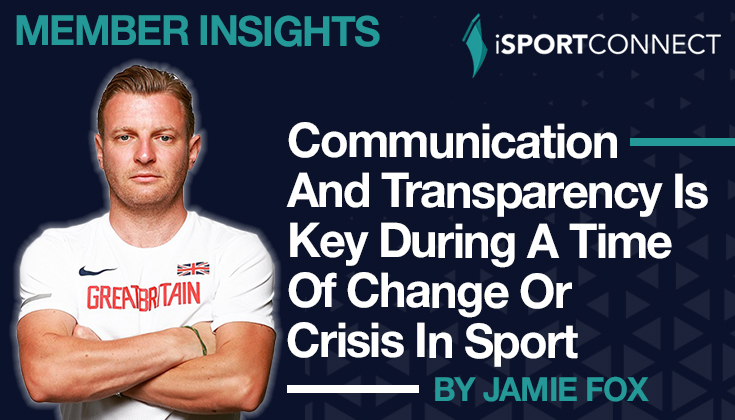Communication And Transparency Is Key During A Time Of Change Or Crisis In Sport
October 19, 2020
In his new monthly column for iSPORTCONNECT, Jamie Fox will be addressing current and relevant communications issues within sport. Today, he looks at how organisations are getting it wrong during the current period of uncertainty.
Last Monday Prime Minister Boris Johnson’s official spokesperson accused the Premier League and its ‘Big Six’ of “backroom dealing that undermines the trust in football governance.” Whilst the irony of this criticism from politicians was not lost on many in sport, it nevertheless did strike a chord with journalists and fans alike who felt some club owners were “acting in self-interest” rather than in a concern for England’s football pyramid.
The following day, British Gymnastics chief executive Jane Allen gave her first interview since allegations of mistreatment of gymnasts emerged in July. Her failure to publicly address these allegations for three months had seen Amy Tinkler tell the Daily Mail just a few days previously that she has “no confidence” in British Gymnastics’ ability to handle complaints and that “They are protecting each other rather than the athletes.”
At times of change and crisis it can be incredibly tough for sports bodies to strike the right balance between transparency and the disclosure of sensitive information.
While the subjects and governance structures of the bodies involved in these two cases are completely different, the public criticism of both emanates from a lack of communication and transparency.
At times of change and crisis it can be incredibly tough for sports bodies to strike the right balance between transparency and the disclosure of sensitive information – whether that be in relation to business confidentiality or the protection of personal privacy during investigations, as in each of these cases.
These tough choices can lead to some CEOs instructing their Communications Director to shut up shop. The consequence of this strategy often leads to a build-up of mistrust and a thirst for accountability, which in turn can result in athletes, the media, or fans feeling like part of the story has been unnecessarily or suspiciously withheld from them.
For communications directors to be able to help our organisations and provide value we need to be allowed to communicate.
Being transparent and communicating with these groups cannot just be reserved for when it feels good, when it’s convenient or when it’s easy. It may sound obvious, but for communications directors to be able to help our organisations and provide value we need to be allowed to communicate, not just to be used as gatekeepers who pull up the drawbridge and try to keep the world out.
In certain situations, CEOs may have legitimate concerns and reservations about making statements or taking part in interviews. But the answer isn’t to just stop communicating. In this digital age, where everyone has a voice and the potential for a global platform in the palm of their hand, that’s not even plausible. The answer is to communicate in the right way – transparency does not mean unqualified or unconditional disclosure of all information all the time, no matter the consequences.
There will be times when the press demand to know more publicly, but often the working stance of many journalists will differ when it comes to understanding where a reasonable balance of transparency is struck. The point is that there has to be a dialogue between the two sides to achieve this balance.
If athletes, journalists, or fans believe an organisation is doing things wrong or that proposed changes are a bad idea, they need to be engaged with and communicated with.
If athletes, journalists, or fans believe an organisation is doing things wrong or that proposed changes are a bad idea, they need to be engaged with and communicated with. Organisations that do this will strengthen their position by publicly explaining their reasoning, and opponents may develop a new appreciation and understanding of their strategies.
And when everyone knows exactly what decisions are being made, how they’re being made, and whether the athletes’ and sport’s interests are being well served, then that’s how good governance works and how progressive change happens.
Jamie Fox is one of the United Kingdom’s leading sports communications consultants. He has worked in senior positions for various national teams, Olympic and Paralympic Organising Committees, National Governing Bodies and International Federations.


